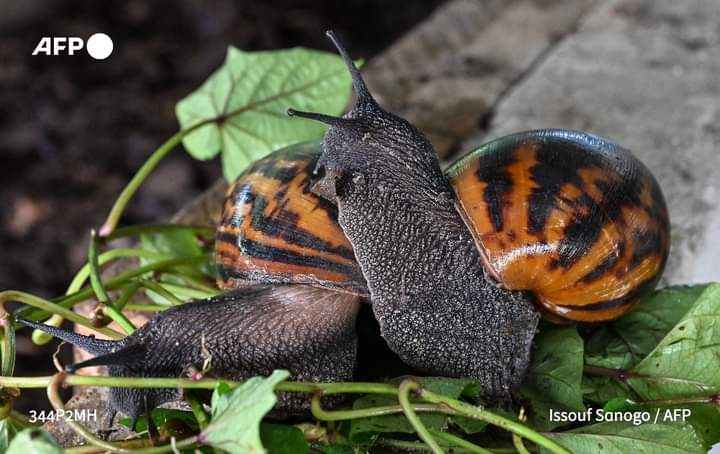They may weigh a maximum 500 grams and only grow to 10 centimetres (four inches) at most -- but farming of giant snails is proving big business in Ivory Coast.
Considered a delicacy for their tasty flesh, the slime and shells of the giant snails are also used to make cosmetics.
But nearly 90 percent of the West African country's forests have disappeared over the last 60 years, something which, together with widespread use of pesticides have decimated wild snails' natural habitat.
Most forest has been lost to agricultural production in the world's top producer of cocoa -- to the detriment of the creatures which naturally thrive in a hot, humid environment.
As wild snail numbers have steadily fallen, farms specialised in breeding them have increasingly sprung up -- some 1,500 in the humid south alone.
A popular appetiser in Ivory Coast, the snails are bred in farms such as one of many in the town of Azaguie, some 40 kilometres (25 miles) north of the commercial capital, Abidjan.
Inside some 10 brick and cement containers topped with mesh lids is a layer of earth and another of leaves.
Between the two slither thousands of snails, juveniles and breeders -- some much larger than those found in Europe.
The gastropods are watered and fed every two days.
Purists swear by the "wild" snail captured in the forest, on the grounds, they say, of its tastier meat.
But Bernus Bleu, founder and director of Ivory Coast Snail Expertise (CIEE), one of the largest companies producing, processing and marketing giant gastropods, rejects that view.
His company's watchword is "same snail, same taste" -- he insists there is no difference in taste between those which roam wild and the farmed variety.
On the farms "we reproduce the natural environment of rainforest snails and they only eat leaves, fruits, vegetables, corn, millet and soya. No pesticides are used, it is entirely organic," Alexis Famy, CIEE technical coordinator, said.
Jean-Norbert Akesse, a former trader in the Abidjan suburbs who manages one of around 30 Azaguie farms, opened the site in 2021 and has no regrets.
"It's profitable!" he said with a smile, explaining how, on completing his professional training, he invested two million CFA francs (3,000 euros, $3,300) in the enterprise.
Today, the farm brings in 12 million francs per year, a more than comfortable income in Ivory Coast where the minimum wage is 75,000 francs per month (barely $120).
Akesse sells his entire production exclusively to CIEE.
The simplicity of snail farming, its productivity and profitability have attracted thousands of Ivorians to the sector, after first receiving training.
In five years, production has soared from 25 to 250 tonnes of snails per month, according to the government.
Created six years ago, CIEE has 50 farms and processing units, employs 75 staff, trains some 200 people per month and helps to get them established.
Most create their own livestock farms or join cooperatives with intra-company contracts.
From around 25,000 farms currently, the sector is targeting bumping up the number of producers to 100,000 in the next few years.
"With the snail, nothing gets thrown away," said Bleu.
The flesh, which is very popular with Ivorians as well as in neighbouring Gulf of Guinea countries, is typically consumed with a spicy sauce or grilled on skewers.
It's an affordable dish, often served in popular bars and restaurants called "maquis".
The slime is used to make soap, shower gel or ointment, while the powdered shell is used in the manufacture of other cosmetics or animal feed.
At the CIEE's headquarters in Azaguie, women make soap and shower gel from snail slime, mixed with coconut oil, green colouring and perfume.
On average, the small, rudimentarily equipped workshop produces some 5,000 soaps and 5,000 bottles of gel each week.
"Snail slime hydrates the skin, removes impurities and prevents its ageing," workshop supervisor Nelly Blon said.



















































